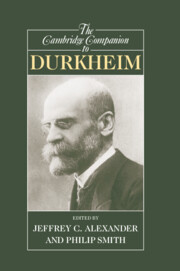Book contents
- Frontmatter
- 1 Introduction: the new Durkheim
- Part I: Life, context, and ideas
- Part II: Symbols, rituals, and bodies
- Part III: Solidarity, difference, and morality
- 12 Durkheim, solidarity, and September 11
- 13 Is Durkheim a class analyst?
- 14 Durkheim’s society revisited
- 15 Beyond solidarity? Durkheim and twenty-first century democracy in a global age
- Further reading
- Index
15 - Beyond solidarity? Durkheim and twenty-first century democracy in a global age
from Part III: - Solidarity, difference, and morality
Published online by Cambridge University Press: 28 April 2008
- Frontmatter
- 1 Introduction: the new Durkheim
- Part I: Life, context, and ideas
- Part II: Symbols, rituals, and bodies
- Part III: Solidarity, difference, and morality
- 12 Durkheim, solidarity, and September 11
- 13 Is Durkheim a class analyst?
- 14 Durkheim’s society revisited
- 15 Beyond solidarity? Durkheim and twenty-first century democracy in a global age
- Further reading
- Index
Summary
When the World Trade Center collapsed, something like social solidarity radiated from its ashes. From New York, Washington, DC and Pennsylvania, a sense of common grief and shared bewilderment spread outward, engulfing the entire nation. The intensity of the anguish and the solidarity were perhaps strongest in New York City. Still, they were palpable throughout the nation - in small towns and large, in the countryside and urban centers. The attack struck three buildings in two cities, yet it was experienced as an assault on all. Just when we, US intellectuals, were most tempted to believe that we live in a nation of disparate individuals or disconnected groups, we were reminded, by terrible means, that we do indeed possess something like social solidarity. Evidently, it was there all along. We just did not have the eyes or occasion to see it.
Within weeks of September 11, the shared grief, outrage, and sense of unity also admitted diverse political commentary, national self-critique, and assorted views on why we were targeted and how we should respond. Does the rise of varied voices mark the eclipse of a short-lived solidarity? What difference might it make if we were to recognize solidarity in times of peace and not only in crisis or war? What role does and can solidarity play among us - citizens of liberal democracies?
In this chapter, I consider the nature and place of solidarity in the work of Émile Durkheim, and what lessons that work may hold for pluralistic, democratic societies at the outset of the twenty-first century. In particular, I explore Durkheim's notion of solidarity in his work on moral individualism, democracy, pluralism, moral education, economic justice, and globalization. In the concluding section, I ask what role “otherness” plays in Durkheim's thought, by comparing his work to that of Giles Gunn.
- Type
- Chapter
- Information
- The Cambridge Companion to Durkheim , pp. 383 - 409Publisher: Cambridge University PressPrint publication year: 2005
- 7
- Cited by



